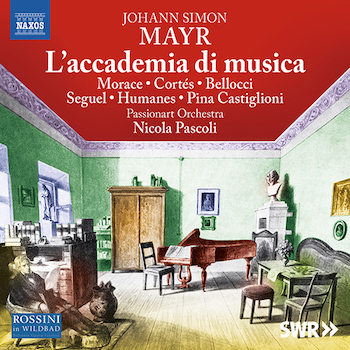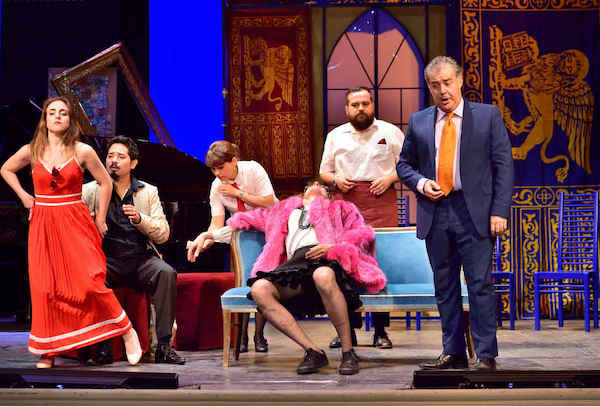Opera Album Review: A Fittingly Fresh First Recording of a Flexible One-Acter by Donizetti’s Teacher
By Ralph P. Locke
Johann Simon Mayr’s delicious L’Accademia di musica gets a spiffy performance from the “Rossini in Wildbad” Festival.
Johann Simon Mayr: L’Accademia di musica
Eleonora Bellocci (Annetta), Maria del Mar Humanes (Vespina), César Cortés (Valerio), Ricardo Seguel (Cecchino), Filippo Morace (Guglielmo).
Passionart Orchestra, cond. Nicola Pascoli.
Naxos 8.66051—76 minutes
To purchase or hear tracks click here.
 In recent years, recording companies have been letting us hear, often for the first time, about dozens of compositions by Johann Simon (or Giovanni Simone) Mayr, whose dates were 1763-1845. Mayr was born and trained in Bavaria but made most of his impressive career in Italy, using Bergamo as his primary “base camp.” His long life explains why his works are so varied. The early operas and sacred works sound a lot like Haydn and Mozart, the middle works embody the norms that Rossini would go on to expand upon, and his later operas (such as his 1821 revision of his 1813 Medea in Corinto) can sit comfortably next to those of Donizetti and others. Indeed, Mayr was Donizetti’s most important teacher and adviser (in Bergamo).
In recent years, recording companies have been letting us hear, often for the first time, about dozens of compositions by Johann Simon (or Giovanni Simone) Mayr, whose dates were 1763-1845. Mayr was born and trained in Bavaria but made most of his impressive career in Italy, using Bergamo as his primary “base camp.” His long life explains why his works are so varied. The early operas and sacred works sound a lot like Haydn and Mozart, the middle works embody the norms that Rossini would go on to expand upon, and his later operas (such as his 1821 revision of his 1813 Medea in Corinto) can sit comfortably next to those of Donizetti and others. Indeed, Mayr was Donizetti’s most important teacher and adviser (in Bergamo).
Most of the Mayr that has come to ARG has been conducted by Franz Hauk, often using Munich-based ensembles that Hauk co-founded (e.g., Concerto de Bassus) and performing editions that he made. (I reviewed some, appreciatively, here, here, here, and here.) The one big exception thus far is Medea in Corinto, which has gained a place in the international repertory and thus has gotten recorded several times over. I reviewed a recording that features, as Giasone, the splendid tenor Michael Spyres and is conducted by no less than Fabio Luisi, who was for seven years Principal Guest Conductor and then Principal Conductor at the Met.
Well, now it looks like Mayr has been adopted by the Rossinians: the new recording (presumably a world premiere) was made during two performances in 2019 (i.e., pre-Covid) at the renowned Rossini in Wildbad festival in the Black Forest region of Germany. The singers are all smallish-voiced but spiffy and text-aware, as we have grown to expect from Wildbad. The orchestra (from Kraków, Poland) plays smartly under the direction of Nicola Pascoli. Andrés Jesus Gallucci contributes lively support and commentary from the fortepiano.
L’Accademia di musica (1799) is a one-act “farsa” — a short comic work that would have been put on a program with another farsa and perhaps a short ballet — about two young loving couples and various barriers that they have to overcome. Vespina and Cecchino (soprano and baritone) are servants in the home of the wealthy Guglielmo (apparently a widower); each is prone to jealousy about the other. Guglielmo’s son Valerio (tenor) and the young Venetian woman Annetta (soprano) have to face up to objections from Guglielmo and from Annetta’s brother Momoletto. Vespina figures out a scheme that works: Annetta easily makes Guglielmo (who is a woman-chaser) fall for her, but requires him to promise to let his son Valerio marry any woman that Guglielmo finds acceptable. Since Guglielmo has clearly found Annetta plenty appealing, he is now obligated to let his son marry her!
The libretto is an early one by Gaetano Rossi, who would go on to write important libretti for Rossini (Semiramide) and Donizetti. It contains some amusing characterizations and some passages in Venetian dialect. The action culminates in a concert (“accademia di musica,” as such things were then called) in Guglielmo’s home. The concert begins with an overture that the music-loving Momoletto conducts, commenting (in sung lines, not spoken ones) all the way through.

A scene from the 2019 performance of L’Accademia di musica in the“Rossini in Wildbad” Festival. Performers (l to r) Annetta (Eleonora Bellocci), Valerio (César Cortés), Vespina (Maria del Mar Humanes), Momoletto (Filippo Pina Castiglioni) disguised (just barely)as Marfisa, Cecchino (Ricardo Seguel), and Guglielmo (Filippo Morace). Photo: Patrick Pfeiffer
Arias and duets are generally brief, often in one movement, or two: slow, then fast. There’s a central quartet of confusion. The work has a certain built-in flexibility: during the house-concert, the librettist and composer intended the singers to interpolate numbers from elsewhere. In this production, we hear two Venetian songs, one of which (in a French rewording, as arranged — anachronistically — by Rossini) is nicely sung by Guglielmo; the other characters eventually join in, and end up sobbing in sympathy with the song’s gondolier, who must leave his beloved Venice and join the crew of a sailing ship on the open sea.
Elsewhere in the opera, the Wildbad singers interject brief phrases or passages from operas by Mozart or even (again, anachronistically) by later composers, for example, Mistress Quickly’s “Reverenza!” phrase from Verdi’s Falstaff (1893!). There are also a few quasi-improvised spoken asides in English and German. The audience cannot be heard responding to these various musical and verbal jokes, nor to the moment when Cecchino and Valerio join hands in the dark, each thinking the other is Vespina. But they do applaud with vigor after certain numbers, especially ones that end with an interpolated high note for a soprano or tenor. Fortunately, the sound-editors (from Southwest German Radio or Naxos) have trimmed applause to a minimum.
The libretto, Italian-only, is available for free online, as is the informative booklet essay. The libretto helpfully prints in gray the recitatives that were deleted or replaced and, through curly brackets, anything that was added. But it omits certain quasi-improvised bits, including remarks by Momoletto in Venetian dialect.
The full CD booklet (with track list and synopsis) is available online to Naxos Music Library subscribers. Those who intend to stream the recording may want to find out if their local library subscribes to Naxos Music Library or might consider subscribing themselves.
Ralph P. Locke is emeritus professor of musicology at the University of Rochester’s Eastman School of Music. Six of his articles have won the ASCAP-Deems Taylor Award for excellence in writing about music. His most recent two books are Musical Exoticism: Images and Reflections and Music and the Exotic from the Renaissance to Mozart (both Cambridge University Press). Both are now available in paperback; the second, also as an e-book. Ralph Locke also contributes to American Record Guide and to the online arts-magazines New York Arts, Opera Today, and The Boston Musical Intelligencer. His articles have appeared in major scholarly journals, in Oxford Music Online (Grove Dictionary), and in the program books of major opera houses, e.g., Santa Fe (New Mexico), Wexford (Ireland), Glyndebourne, Covent Garden, and the Bavarian State Opera (Munich). He is on the editorial board of a recently founded and intentionally wide-ranging open-access periodical: Music & Musical Performance: An International Journal. The present review first appeared, in a somewhat shorter version, in American Record Guide and is posted here by kind permission.
Tagged: “Rossini in Wildbad” Festival, L’Accademia di musica, Naxos, Passionart Orchestra
